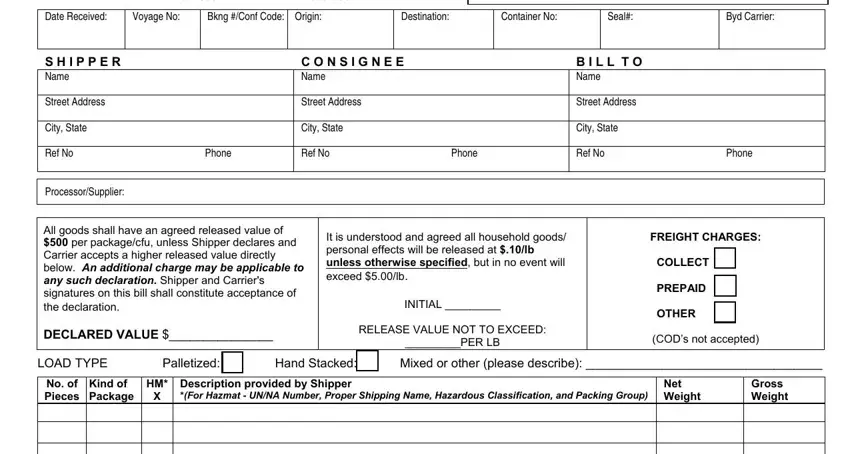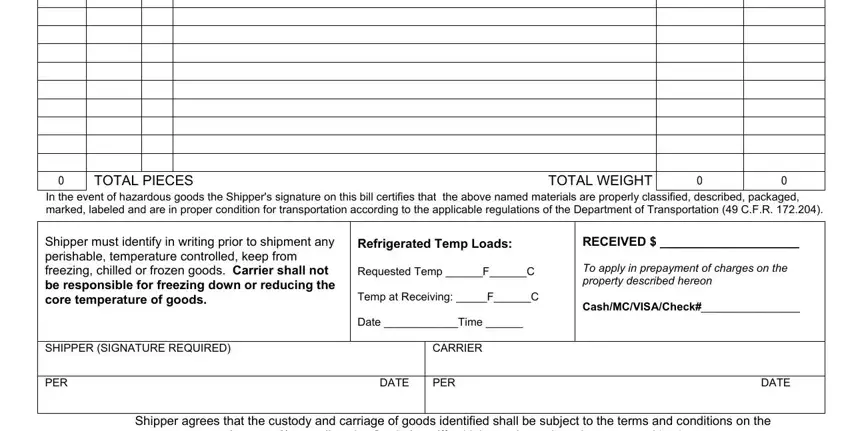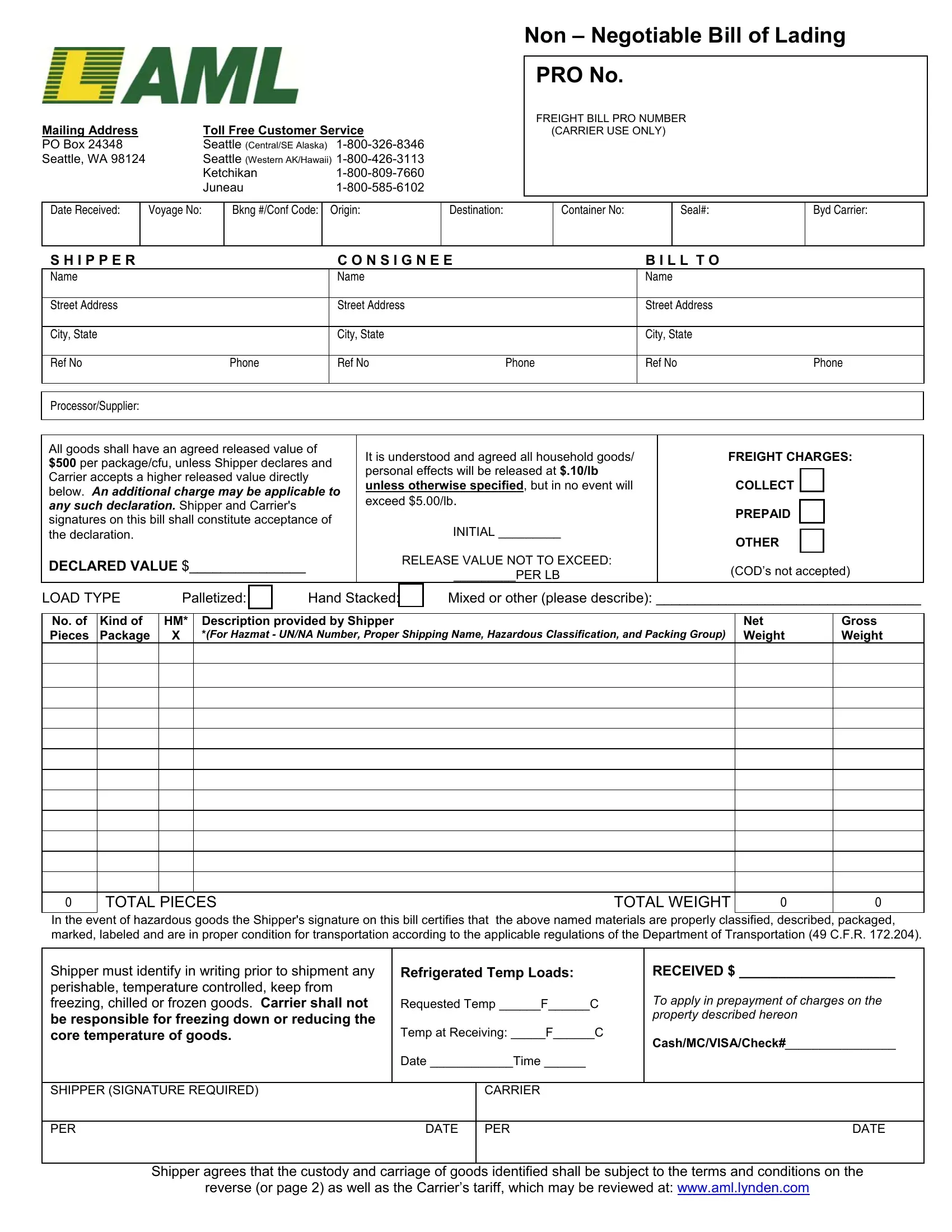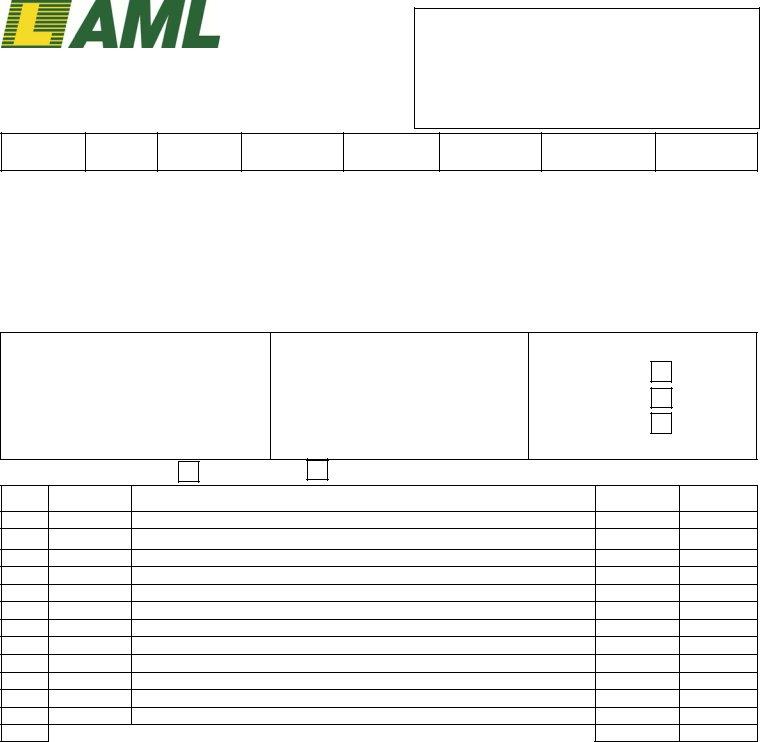1.DEFINITIONS.
a."Carrier" refers to the Lynden entity engaged by Shipper to provide transportation services with respect to the goods. For a list and description of the various Lynden entities, please visit our website at: WWW.LYNDEN.COM.
b."Consignee" refers to the entity identified by Shipper and agreed by Carrier as the entity to receive the goods.
c."Goods" refers to those items of goods, cargoes, commodities and other personal property with respect to which Carrier has been requested to or does perform transportation services, including all items and materials associated with the goods, such as any boxes, crates, cradles, pallets, tanks, platforms, flatracks and/or containers.
d."Entity" refers to all forms of business entities as well as to natural persons.
e."Load" refers to all goods of Shipper in/on a single container, flatrack, platform, trailer, etc.
f."Shipper" refers to the entity engaging Carrier with respect to the goods as well as the owner(s), consignor, consignee and all others who may have right of claim by, through or with respect to the goods.
g."Shipment" refers to all goods identified on a singularly numbered bill of lading or air waybill, as applicable (but which bill of lading or air waybill may contain multiple parts).
h.”Package,” for purposes of COGSA and as otherwise applicable herein, shall mean: i) the entire contents (including all individual packages, boxes and crates and all Goods contained in each such package, box or crate) of a shipping device in the case of goods transported by Carrier in or on a shipping device defined as including, but not limited to, containers, vans, trailers (of all kinds), tanks, platforms or flatracks; or ii) the entire content of a unitized lift in the case of goods bundled, strapped or otherwise secured together and forming a unit transported by Carrier and not otherwise loaded in or on a shipping device; or iii) any
individual unit of cargo including machinery, equipment and other items transported as a single unit without further consolidation; or iv) in the case of bulk goods or goods not otherwise defined herein, the totality of goods identified on a singularly numbered bill
of lading issued by Carrier. Notwithstanding the foregoing, in the event that Carrier consolidates goods from different customers into/onto a shipping device or as a portion of a unitized lift, for Carrier’s benefit and not at the direction of Shipper, the “package”
definition in subsections (i) and (ii) above shall be modified such that content is defined as that portion of the content being transported for Shipper.
2.FREIGHT AND OTHER CHARGES.
a.Freight, Storage and Other Charges. Freight, storage and other charges of Carrier shall be as identified by Carrier in its applicable rate quotation, transportation agreement, bill of lading, air waybill and/or tariff, as applicable. Freight, storage and other charges of Carrier which had been based upon inaccurate or incomplete instructions or particulars may be recalculated by Carrier at any time without advance notice.
b.Other Charges and Expenses. Shipper shall be responsible for all charges and expenses relating to the goods and/or their transportation, including, without limitation, all dues, taxes, duties, fines and penalties, advances made by Carrier, additional costs and expenses incurred by virtue of Shipper's actions, omissions or failure to comply with its obligations hereunder, as well as those incurred as a result of unforeseen or extraordinary circumstances.
c.Payment. Freight, storage and other charges shall be deemed fully earned upon tender of the goods by Shipper for transportation and payable in advance and prior to delivery unless otherwise agreed in writing by Carrier. Amounts due Carrier shall be paid in U.S. dollars without deduction or offset. Interest on amounts due but not paid shall accrue at the rate of one and one-half percent (1.5%) per month. Shipper, including all entities falling within the definition of that term above, shall be jointly and severally liable for payment of all amounts due Carrier respecting the goods.
d.Lien. Shipper, including and on behalf of all entities falling within the definition of that term above, agrees that Carrier shall be entitled to a security interest in and lien upon all goods of Shipper in Carrier's constructive or actual possession, to secure the payment of any freight, storage or other charges or amounts owed by Shipper to Carrier. Shipper authorizes Carrier to file financing statements and agrees that Carrier may store and/or sell such goods, at the risk and expense of Shipper, unless and until all such amounts have been paid to Carrier.
3.INFORMATION FROM SHIPPER. Shipper warrants the accuracy and completeness of all information, instructions and particulars relating to the goods, including their nature, description, special characteristics, marks, number, weight, volume and quantity, etc., upon all of which Carrier shall rely. Shipper shall reimburse Carrier for any loss or expense (including additional charges) resulting from any such inaccurate or incomplete information, instructions or particulars.
4.HAZARDOUS GOODS. Shipper must identify to Carrier in writing prior to shipment any goods which require specialized handling or are dangerous or hazardous, and Carrier must specifically agree in writing to transport the same. In such an event, Shipper shall provide complete and accurate handling instructions, including relevant safety procedures, and shall be solely responsible for the completion of all documentation required and otherwise for compliance with applicable regulations and laws relating to the goods and/or the transportation thereof. Should, in Carrier's opinion, any goods create a risk of harm to persons or property and/or make the transportation thereof impractical, Carrier may discharge, store and/or dispose of any or all of such goods at Shipper's sole risk and expense.
5.REFRIGERATED, PERISHABLE AND VALUABLE GOODS. Shipper must identify to Carrier in writing prior to shipment any perishable, temperature controlled, keep from freezing, chilled or frozen goods, and Carrier must specifically agree to transport the same. In such an event, Shipper shall identify in writing to Carrier the nature of the goods and the specialty conditions, temperature, humidity, etc. under which they are to be transported and shall also be responsible for tendering the goods to Carrier with a uniform core temperature below that at which the goods are to be transported. Carrier shall not be responsible for freezing down or reducing the core temperature of goods but, rather, only for maintaining an ambient temperature in the relevant conveyance such that the core temperature of such goods remains within ten (10) degrees Fahrenheit of the temperature at which such goods were tendered to Carrier. Carrier shall not be responsible for stains, discolorations, holes, chafing, breakage or splitting of lumber, timber, plywood, wood products, etc., whether or not protected and/or covered. Shipper shall not tender for transportation any art objects, bank bills,
coins, currency, drafts, notes, valuable papers, precious metals, precious stones, antiques or any other rare, old, precious or semi- precious articles of extraordinary value. Shipper shall not tender for transportation any live animals without prior notice and Carrier’s
express consent.
6.TENDER OF GOODS. Shipper shall be responsible for tendering the goods to Carrier at the time and place identified, with all such goods to be in good order, count and condition, and packaged, protected, packed, stowed and/or shored sufficiently to withstand the rigors of storage and transportation, including without limitation transportation by uncovered barge and exposure to weather, moisture, humidity, heat, rolling, pitching and similar barge movements, if applicable.
7.ROUTES, METHODS, ETC. Carrier shall perform with due diligence but does not warrant or guarantee any particular speeds or departure/arrival dates/times. Carrier shall have liberty with respect to the selection of conveyances, routes, procedures, modes and methods of transportation. Carrier shall not be responsible for any delay, inability to perform or failure to perform caused by events beyond its direct and reasonable ability to control, including without limitation, ice preventing or delaying a Vessel in reaching a loading berth, loading/unloading of cargo, or departure of a Vessel. In the event of such a hindrance, Carrier shall, if feasible, notify Shipper and request instructions, or if insufficient time exists or instructions are not provided shall, at Shipper's risk and expense, store and/or dispose of the goods as it deems reasonable under the circumstances.
8.LIBERTIES. Carrier shall be at liberty to call at any port/place to replenish fuel, oil, stores or other necessaries and/or make repairs. Carrier may deviate in attempt to save life or property, and with respect thereto may leave the cargoes in a position believed safe. Carrier may select any route, speed, transportation arrangement believed reasonable under the circumstances, including tandem barge towage if by water. In the event of accident, danger, damage, disaster or other event occurring after departure on any voyage or trip which, in the opinion of Carrier, prevents or may prevent the safe completion of such, Carrier may discharge, unload and/or store cargoes at Shipper's risk and expense.
9.IN-TRANSIT STORAGE. Carrier may store goods in-transit and await further instructions from Shipper. Upon notice to and approval from Carrier (which shall not be unreasonably withheld), Shipper shall be given access to goods stored in-transit during normal business hours for the facility, provided that Shipper is accompanied by a representative of Carrier and an additional access charge may apply. All storage of the goods shall be deemed in-transit and subject to these terms and conditions unless agreed otherwise by Carrier in writing, including through Carrier's issuance of a warehouse receipt.
10.DELIVERY OF GOODS. Carrier shall deliver or arrange for delivery of the goods to Consignee at the location identified by Shipper and agreed by Carrier. Consignee shall be obligated to receive and take the goods as promptly as they can be discharged/unloaded from the conveyance, with such discharge/unloading to be at Shipper's risk and expense. Goods received and taken by Consignee, tendered to Consignee and refused or otherwise not received and taken, seized by government authority and/or under legal process, which cannot be delivered because of Shipper's fault or neglect, including inaccuracy/inadequacy of instructions or particulars, or which for any other reason beyond Carrier's control have not been received and taken, shall nonetheless be deemed fully delivered to Consignee and Carrier's responsibility with respect to such goods and this agreement shall thereupon cease. Any actions taken by Carrier with respect to the goods thereafter shall be performed as Shipper's agent and at Shipper's risk and expense.
11.INTERNATIONAL TRANSPORTATION BY AIR. In the event of international transportation by air, the Montreal Convention may be applicable. In such an event, the transportation by air shall be subject to said Convention and Carrier's liability for loss/damage to the goods shall be limited in accordance with said Convention, which shall override anything herein to the extent of any conflict. Shipper should contact Carrier directly, and review its applicable schedule/tariff(s), available at WWW.LYNDEN.COM, for more information as to international transportation by air.
12.TRANSPORTATION BY WATER. In the event of transportation by water, domestic or international to/from the United States, the U.S. Carriage of Goods By Sea Act (COGSA) shall be incorporated herein and applicable at all times the goods are in Carrier's
custody, care and/or control, including before loading to the vessel, through transportation, after discharge and until delivery. In addition, for transportation by water, Shipper hereby authorizes transportation on deck and/or by unmanned barge, and acknowledges that New Jason/General Average and Both to Blame clauses shall also be applicable and incorporated herein. Shipper should contact Carrier directly, and review its applicable schedule/tariff(s), available at WWW.LYNDEN.COM, for more information as to transportation by water.
REV. 09-19-17
13.LOSS/DAMAGE TO GOODS. Carrier's liability with respect to the goods, and/or Shipper, Consignee and/or any other person or entity claiming by, through or with respect to the goods, and whether for loss, damage, delay, shortage, misdelivery, failure to deliver or otherwise, shall be only as follows:
a.Exceptions. Carrier shall not be liable for any loss, damage, delay, shortage, misdelivery, failure to deliver or other result caused by: act of God; peril of land, sea or air; act of terrorism; act of public enemy; act of war; act of public or government authority or other with apparent public or government authority; fire, unless caused by the actual fault or privity of Carrier; quarantine; act or omission of Shipper, its agent or representative; strike, lockout or other labor dispute; sabotage; riot or other civil commotion; wastage in bulk or weight or arising from the nature of the goods; inherent vice; improper and/or insufficient packing, securing, packaging, marking or addressing; latent defect not discoverable by due diligence; compliance with instructions from Shipper; goods loaded by Shipper into sealed containers or other packages, providing the seal or package remains unbroken and not physically damaged; errors in operation or navigation of a vehicle, vessel or other conveyance; or any other cause or event arising without the actual fault and privity of Carrier.
b.Consequential Damages. Carrier shall not be liable for any indirect, consequential or special damages of any type or nature whatsoever and howsoever arising, including without limitation loss of profits, loss of income, loss of business opportunity, business interruption, loss of use and/or loss of ability to use undamaged component or system parts, regardless of whether resulting from negligence, breach or otherwise, and/or whether such may have been foreseeable.
c.Limitation of Liability and Option to Declare Higher Value. Subject to section 11 (international transportation by air) and section 12 (transportation by water), above, as applicable, Carrier's liability with respect to the goods, and whether for loss, damage, delay, shortage, misdelivery, failure to deliver or otherwise, shall be the lesser of the actual cost to repair, replace and/or deliver the goods or the valuation applicable to Carrier identified directly below:
ALASKA MARINE LINES, INC. |
: $500 per package/cfu under COGSA |
|
However, in some cases Alaska Marine Lines, Inc. has accepted certain extended |
|
liability for cargo loss or damage as outlined in its tariffs. Such tariff provisions shall |
|
supersede this Bill of Lading when in conflict, but only to the extent of such conflict. |
ALASKA MARINE TRUCKING, LLC |
: $.50 (fifty cents) per pound. |
ALASKA WEST EXPRESS, INC. |
: $.10 (ten cents) per pound. |
BERING MARINE CORPORATION |
: $500 per package/cfu under COGSA. |
BROWN LINE, LLC |
: $.50 (fifty cents) per pound. |
LTI, INC. |
: $.10 (ten cents) per pound. |
LYNDEN AIR CARGO, LLC |
: $.50 (fifty cents) per pound, but with a minimum of $50 per shipment. |
LYNDEN AIR CARGO (PNG) LTD. |
: $.50 (fifty cents) per pound, but with a minimum of $50 per shipment. |
LYNDEN AIR FREIGHT, INC. |
|
(DBA LYNDEN INTERNATIONAL) |
: $.50 (fifty cents) per pound, but with a minimum of $50 per shipment. |
LYNDEN LOGISTICS, INC. |
: $.10 (ten cents) per pound. |
LYNDEN TRANSPORT, INC. |
: $20 (twenty dollars) per pound, up to a maximum of $200,000 per load. |
All amounts above are in US dollars. Notwithstanding the foregoing, for goods originating in Canada and transported by motor Carrier, Carrier's liability shall be the lesser of the actual cost to repair, replace and/or deliver the goods or CAN $2.00 per pound, up to a maximum of US $200,000 per load. However, if Shipper has declared in writing to Carrier a valuation for the goods which is higher than the foregoing amount, and Carrier has agreed to carry the goods at the higher valuation so declared, then Carrier's liability shall be the lesser of the actual cost to repair, replace and/or deliver the goods or the higher valuation so declared and agreed, with Shipper to pay increased freight charges for any such declaration as set forth in Carrier's applicable rate tariff and/or other schedule of charges.
Carrier shall not be liable to Shipper or any other claiming by, through or with respect to the goods, whether for loss, delay, shortage, misdelivery, failure to deliver or otherwise, or in tort, contract or upon any other theory, other than as set forth herein, and Shipper agrees to indemnify and hold Carrier harmless (including legal fees and costs) from and against any loss, damage, expense, liability, claim, fine, penalty and/or suit arising out of or in any fashion whatsoever relating to the goods or their transportation.
d.Delivery in Good Condition. Delivery of the goods without written notification of damage on the bill of lading, way bill or delivery receipt shall be prima facie evidence that the goods have been delivered in the same good order, count and condition as when initially received by Carrier.
e.Claims. As a condition precedent to any recovery against Carrier:
1.The goods must be carefully inspected by Shipper or Consignee immediately upon delivery, and any loss or damage which would then be evident must be noted in writing to Carrier on the bill of lading, waybill or delivery receipt, or the goods shall be conclusively presumed to have been delivered in the same good order, count and condition as when initially received by Carrier.
2.In the event of any loss or damage not ascertainable at delivery, written notice must be given to Carrier within three (3) days of delivery for transportation by water, under COGSA, within seven (7) days of delivery for U.S. domestic air transportation, and otherwise within fifteen (15) days of delivery, after which time and with no written notice having been given it shall be conclusively presumed that the goods were delivered in the same good order, count and condition as when initially received by Carrier.
3.In the event of goods delayed, lost or otherwise not timely delivered, Carrier must be given written notice within three (3) days of delivery for transportation by water, under COGSA, within seven (7) days of delivery for U.S. domestic air transportation, and otherwise within fifteen (15) days of delivery, or from the date upon which the goods should have been delivered, or the goods shall be conclusively presumed to have been delivered in the same good order, count and condition as when initially received by Carrier.
4.Carrier shall have a reasonable opportunity to inspect the goods, including their packing and packaging, in the same condition as upon delivery and before any alteration or destruction thereof.
5.Written claim for loss/damage, specifying the full particulars thereof and the amount(s) being claimed, must be filed with Carrier within ninety days for U.S. domestic air transportation or otherwise within nine (9) months of delivery, from the date on which the goods should have been delivered, or the date on which Carrier disallowed the claim or pertinent part of the claim, whichever is later.
6.Suit against Carrier must be filed within one (1) year for transportation by water, under COGSA, within one (1) year for U.S. domestic air transportation, or otherwise within two (2) years, from delivery, the date which the goods should have been delivered, or the date on which Carrier disallowed the claim or pertinent part of the claim, whichever is later.
7.There shall be no recovery against Carrier until freight and all charges due Carrier with respect to the goods and/or their transportation have been fully paid and received by Carrier.
14.SUBCONTRACTING. Carrier shall be entitled to subcontract on any terms and/or conditions the whole or any part of the transportation services, including without limitation to its affiliated entities, with all such subcontractors entitled to the same limitations upon, and exemptions and defenses to, liability granted to Carrier hereunder, at law or otherwise.
15.EXTENSION OF BENEFITS. All limitations upon, and exceptions and defenses to, liability granted to Carrier hereunder, or at law or otherwise shall be automatically extended to all parent, subsidiary and/or affiliated entities of Carrier (including its and their respective owners, directors, officers, employees and agents) and to all vessels, vehicles, aircraft, conveyances, carriers, contractors, subcontractors, stevedores, managers, agents and all other persons/entities and equipment utilized and/or providing any services whatsoever with respect to the goods or their transportation.
16.BILLS OF LADING, AIR WAYBILLS, RECEIPTS, ETC. Bills of lading, air waybills, receipts, etc. may be signed by the respective agents and representatives of the parties, including in counterparts and/or by electronic means; upon Shipper's consent, verbal or otherwise, Carrier may complete and/or sign for and on behalf of Shipper, as its authorized agent for such limited purposes.
17.INTEGRATION, MODIFICATION AND CONSTRUCTION. Upon tender of goods to Carrier, Shipper shall be deemed to have consented and agreed to these terms and conditions, which shall be applicable to all services provided by Carrier and supersede any bill of lading, air waybill, receipt or other document from any entity other than Carrier, including any such document from Shipper. These terms and conditions shall not be modified except through a writing signed by an authorized representative of Shipper and the executive officer of Carrier; no other agent, employee or representative of Carrier has authority to alter, modify or waive these terms and conditions. These terms and conditions, along with any transportation agreement, bill of lading, air waybill, rate quotation, load confirmation, delivery receipt, freight invoice and/or other document issued or executed by Carrier with respect to the goods, and Carrier's applicable schedule(s) and tariff(s), available at WWW.LYNDEN.COM, all of which are fully incorporated herein by reference, constitute the entire agreement between the parties, and supersede all prior and contemporaneous agreements, regarding the goods or their transportation, written and oral. This agreement shall be construed neutrally, and as the mutual assent of both parties, rather than for or against a party. The headings used herein are for convenience of reference only.
18.GOVERNING LAW, DISPUTE RESOLUTION AND LEGAL FEES. The laws of the United States shall govern this agreement to the extent there is an applicable United States statute or rule of law, and otherwise the laws of the State of Washington shall govern. Any dispute relating to this agreement, and/or to the goods and/or their transportation, shall be resolved through litigation in the state or federal court in Seattle, Washington, with the parties consenting to its personal jurisdiction and the applicability and convenience of said venue. Unless specifically prohibited by law, the substantially prevailing party in any such litigation shall be entitled to recover its reasonable legal fees and costs.




